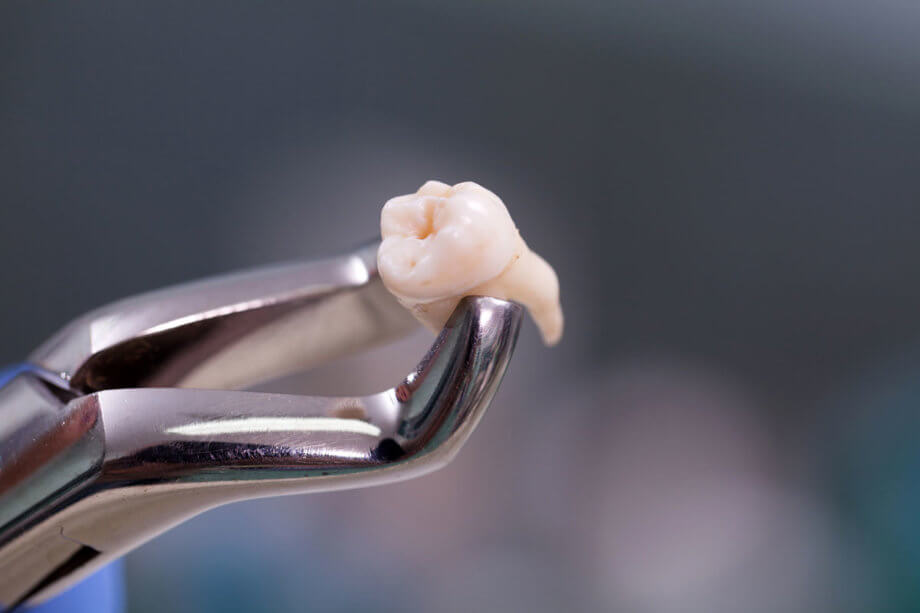Tooth enamel is one of the hardest substances, but even it can crack at just the right moment. And that moment seems to happen when you least expect it. You may be almost done with a bowl of popcorn when you bite down on one kernel – and it cracks your tooth. Here is everything you need to know about how to tell if your tooth is cracked. Risk Factors of a Cracked Tooth There are a few risk factors for a cracked tooth that you should look out for to reduce your chances of having one. Eating hard foods: Some foods we eat are crunchy and hard. But no matter how good they taste, they can be dangerous for your teeth. This includes hard candy, ice, popcorn kernels, etc. Limit your consumption as it only takes biting down one time to crack a tooth. Bruxism: Grinding and clenching your teeth can weaken them over time. If you grind your teeth at night or tend to clench your jaw when you are stressed or angry, then talk to your dentist about your treatment options. Keeping your teeth strong and healthy will reduce your risk of a cracked tooth. Weakened teeth: If you have teeth that have undergone dental work that have crowns or large fillings, they may have lost some integrity along the way making them easier to crack. Switching between hot and cold temperatures can also cause a weakened tooth to crack. Avoid having cold drinks with hot food …
How Do You Tell If You Need A Root Canal?
A root canal is a dental procedure that is used to restore the health of a tooth. It is sometimes called root canal treatment or endodontic treatment. Endodontics is a specialization in the field of dentistry that focuses on diagnosis and treatment of conditions affecting the dental pulp, the soft tissue in the center of each tooth. Root canals are one of the most common endodontic procedures. You may need a root canal to treat an infected tooth, to prevent a tooth from developing an infection, or for other dental health reasons. How do you know if you need a root canal? Here are some of the most common symptoms that indicate you may be in need of endodontic treatment. What is a Root Canal? The root canal is the inner chamber of the tooth that contains soft tissue called dental pulp. Root canal treatment is the procedure that is named for the part of the tooth it addresses. Root canal treatment involves removal of the dental pulp from the inside of the tooth and filling the root canal with replacement material that fortifies the tooth and prevents infection. Signs You May Need a Root Canal The following signs and symptoms may indicate the need for root canal treatment: Severe Tooth Pain. If your tooth is infected, meaning there is a bacterial infection of the dental pulp, you’ll most likely feel severe pain in the tooth. This pain may be persistent or it may come and go. Either way, the …
How Do You Fix A Cracked Tooth?
A cracked tooth can happen at any time. It is more common in adults because your tooth enamel weakens as you age. If a tooth has thin and brittle enamel, all it takes is for you to bite down on something hard, grinding your teeth, or getting bumped in the mouth to cause a crack to develop. In many cases a cracked tooth is an easy fix. In other cases, the tooth may not be able to be fixed at all. It all depends on the type and extent of the crack. If you have a cracked tooth, here’s what you need to know about getting it taken care of. Types of Cracks in Teeth There are a few different types of cracks that develop in teeth: Craze lines. Over time teeth develop tiny hairline cracks in the enamel called craze lines. They are only surface deep and cause no pain Cracked tooth. A typical crack in a tooth will start in the crown of the tooth and extend toward the root of the tooth. Whether or not you feel any pain associated with a cracked tooth varies based on the depth of the crack. Vertical root fracture. A tooth may develop a crack that starts in the root under the gumline and extends toward the crown of the tooth. This type may cause pain that is difficult to diagnose because the crack is often not visible above the gums. Split tooth. When a crack in the crown of a …
How Long Does It Take To Recover From An Apicoectomy?
An apicoectomy is an endodontic surgery that is done to save a tooth that has a persistent infection. Endodontics is the field of dentistry that is focused on the dental pulp, the soft tissue contained mostly within the roots of a tooth. An infection of the dental pulp can result in the loss of the tooth unless it is treated. Because an apicoectomy is a surgical procedure, you can expect that a brief recovery period will be necessary. How long does it take to recover from an apicoectomy? Here’s what you can expect. What is an Apicoectomy? An apicoectomy is a procedure that involves the removal of the apex, the end tip, of a tooth root. When an infected tooth is treated with a root canal, but the infection persists, an apicoectomy is a potential next step. The procedure involves making an incision into the gum tissue and accessing the root of the tooth. The tip of the root is removed and the accessible root canal area is thoroughly cleaned out. This area of the canal is filled with a biocompatible material that fortifies the tooth and helps prevent reinfection. Any surrounding infected gum tissue or bone tissue is also removed. The gum tissue is then placed back over the area and sutured. What is the Average Recovery Time Frame? Recovery from a surgical procedure can be looked at in two ways: the length of time it takes to return to your daily activities, and the time it takes to …
What Should You Do If Your Tooth Gets Knocked Out?
Dental emergencies can strike at any time. Some require more urgency than others, but in all cases the important bottom line is to contact your team of dental professionals as soon as possible. Emergency dental trauma includes a number of dental injuries, such as deep cracks, factures, and knocked-out teeth. While dental trauma is most often caused by accidents and sports injuries, it can also happen due to biting into something hard. When the pulp inside a tooth is injured, due to any cause, it can become inflamed or infected. This is true whether or not there Is any visible damage to the tooth’s surface. The reality is that dental trauma can happen, and in many cases trauma means an emergency therapy. In many circumstances, a root canal and restoration will effectively save an injured tooth; in others, an extraction may be necessary. Either way, if you’ve experienced a dental emergency, the best way to save your teeth is by seeking prompt treatment for your injury. Getting a Tooth Knocked Out Whether from sports play, a fall, or an automobile accident, getting a tooth knocked out requires urgent dental intervention. Your chances to save the natural tooth decreases between 30 to 60 minutes after the injury occurs. Assuming you can find your tooth, you should: Contact your dentist immediately Hold the tooth only by the crown, which is the top area of the tooth, and rinse off any debris, using water only Don’t wash away any tissue still remaining on …
How Long Does A Root Canal Take?
If you’ve been told you need a root canal, you probably have questions about the treatment. What is a root canal? How long does a root canal take? Are there other options? Can the endodontist save the tooth? Endodontists are dentists who specialize in saving teeth by treating the inside of a tooth. They perform root canal procedures to treat damaged or infected pulp, treat cracked or broken teeth, and perform procedures after accidents that injure teeth. What is a root canal? The term “root canal” comes from cleaning the canals inside a tooth’s root. Root canals and associated procedures remove the inflamed or infected pulp. Root canal treatment, or endodontic treatment, can save a tooth that may otherwise have to be extracted. Root canal treatment is needed when the inner, soft layer of the tooth, known as the pulp, becomes infected through decay or injury. The symptoms of a diseased pulp include: Severe toothache pain upon chewing or application of pressure Discoloration/darkening of the tooth Swelling and tenderness in the nearby gums A persistent or recurring bump on the gums Prolonged sensitivity to heat or cold temperatures (even after the hot or cold source has been removed) The pulp consists of nerves and blood vessels that help the tooth grow during development. Once fully mature, the tooth can survive without the pulp because it continues to be nourished by the tissues surrounding it. A root canal procedure involves removing the diseased pulp and then cleaning and sealing the inside …
What Do You Do When A Permanent Tooth Gets Knocked Out?
Sports injuries, falls, bicycle accidents, and car accidents can all lead to facial trauma, including knocking out a tooth. If you’ve suffered from a knocked-out tooth, try not to panic, but do act quickly. Read on for the American Association of Endodontists’ recommended step-by-step guide of what to do if a permanent tooth is knocked out. Six Steps to Take After a Permanent Tooth is Knocked Out. Find the tooth Do the best you can to locate the tooth, if possible. If you’ve sustained other, serious injuries, this may not be possible. But if your tooth has been knocked out due to an injury such as a fall, or during a sporting activity, it’s best to try to find the tooth. Pick up the Tooth Carefully You should avoid touching the root of the tooth. Instead, pick up the tooth by the crown (visible part of the tooth). Gently remove debris If the tooth is dirty, gently remove debris. Don’t try to scrub it. Avoid using chemicals including soap. Don’t dry it or wrap it in any kind of cloth. Attempt to Put the Tooth in the Socket If you are able, gently guide the tooth back into its socket, and push it down gently. Remember to only touch the crown of the tooth. Keep the tooth moist The tooth needs to stay moist. If you cannot get the tooth back into its socket in your mouth, put it in a small cup of milk if available. If nothing is …
How Do You Know if You Need a Root Canal?
Years ago, just the words “root canal” were enough to strike fear in patients. However, today the procedure is nearly pain-free. Thanks to advances in technology and modern root canal techniques, the procedure can be completed in less than an hour, allowing you to return to normal activities the same day. If your dentist has told you that you need a root canal, here’s an overview of what to expect. What is a root canal? A root canal is also known as endodontic treatment. Root canals are performed to prevent the extraction of teeth that are severely decayed, damaged, or infected. During a root canal, once the entire area surrounding the tooth is numbed, your endodontist will access the pulp (interior) of your tooth. The pulp of each tooth hosts nerves, connective tissues, and blood vessels. Your endodontist will remove this pulp, and clean out any infection in the canals of the tooth. The canals are then sealed with a safe, biocompatible material. After your root canal is completed, you’ll ultimately return to your general dentist to receive a crown, permanent filling, or have your current crown restored. It is important to note that once you have fully-developed adult teeth, you technically no longer need the pulp of your tooth. Root canals allow for the removal of the infected pulp so you can keep your tooth. Signs You May Need a Root Canal The only way to know for certain that you need a root canal is by seeing a …
How Painful Is a Root Canal?
Patients frequently express anxiety before they are scheduled for a root canal procedure, but the majority find that root canal therapy is much more comfortable than they anticipated. Because root canals are frequently performed to alleviate dental pain, our patients usually leave our office feeling better than when they arrived. If you’re not sure what to expect from a root canal treatment, read on to learn more. How Much Pain to Expect During a Root Canal Root canal therapy is used to treat inflamed or infected pulp tissue, which may cause severe dental pain, swelling, difficulty eating, and a range of other symptoms. Endodontic treatment is used to relieve this discomfort. With the use of local anesthesia and modern endodontic equipment and techniques, many patients find that having a root canal treatment is no more painful than having a cavity filled. It’s common to feel pressure and movement during a root canal, but the majority of patients are comfortable throughout their appointment. Endodontic treatment begins by numbing your tooth and its surrounding tissues using a local anesthetic. The tooth is then opened so that we may access the pulp and remove it. To prevent infection and seal the tooth, the chamber and roots are cleaned, shaped, and disinfected before being filled with a specialized rubber-like material. You’ll go to your general dentist within two weeks of your root canal treatment to have a dental crown or filling placed to restore the tooth structure. Patients frequently report feeling immediate relief after …
How to Find the Best Endodontist Near You
Choosing to see an endodontist for a root canal treatment is an excellent decision for your dental health. Endodontists are the only dental specialty that focuses on treating dental pain, root canal therapy, traumatic injury, and other conditions that affect the inside of the tooth, so you can be assured exceptional care. Here’s how to find the best endodontist near you. Board Certification Endodontists must meet the highest standards and pass rigorous examinations demonstrating their expertise in their field. Some endodontists take an additional examination in order to become board-certified by the American Board of Endodontics. Dr. Matthew Lindemann is a board-certified endodontist, an honor that signifies that he has reached the highest level of education in this speciality. Only the most distinguished endodontists in the United States receive the honor of being named a Diplomate of the American Board of Endodontics. Professional Memberships As with any other profession, memberships in professional organizations allow endodontists to stay current with state-of-the-art technologies, new research, and cutting-edge techniques in their field. These memberships demonstrate that an endodontist is committed to furthering their knowledge by pursuing opportunities for continuing education. Dr. Matthew Lindemann is proud to be an active member of the Michigan Dental Association, the Michigan Association of Endodontists, and the American Association of Endodontists. He is also a member of the distinguished American College of Dentists, International College of Dentists, and the Pierre Fauchard Academy. He is the past president of the Michigan Association of Endodontists and is currently an active …
How Long Does a Root Canal Last?
If you’ve never had a root canal treatment before, it’s likely that you have a number of questions about what to expect after the procedure. While the recovery from a root canal is nowhere near as lengthy as that of a tooth extraction, it may take some time before you feel “back to normal” again. Below, we address some of the most common questions patients have about what to expect after a root canal treatment. How long will I be numb? During your root canal treatment, your tooth and the area surrounding it will be numbed with local anesthetic, which can take several hours to wear off. Avoid eating foods that need to be chewed and hot beverages until the numbness has worn off. How soon can I eat and/or drink following the root canal procedure? It’s best to wait until the local anesthetic has worn off before eating, but if you are thirsty or hungry, you should wait at least 30 to 40 minutes after your treatment to ensure that the temporary filling has hardened. Is it okay to eat on the tooth with the root canal? It is best to try to avoid chewing on the tooth with the root canal and to chew on the opposite side of your mouth until your final restoration has been placed by your dentist. You should also avoid hard or sticky foods, as these have the potential to dislodge the temporary restoration. Will I be able to go back to work …
What to Expect After a Root Canal
If you’ve never had a root canal treatment before, it’s likely that you have a number of questions about what to expect after the procedure. While the recovery from a root canal is nowhere near as lengthy as that of a tooth extraction, it may take some time before you feel “back to normal” again. Below, we address some of the most common questions patients have about what to expect after a root canal treatment. How long will I be numb? During your root canal treatment, your tooth and the area surrounding it will be numbed with local anesthetic, which can take several hours to wear off. Avoid eating foods that need to be chewed and hot beverages until the numbness has worn off. How soon can I eat and/or drink following the root canal procedure? It’s best to wait until the local anesthetic has worn off before eating, but if you are thirsty or hungry, you should wait at least 30 to 40 minutes after your treatment to ensure that the temporary filling has hardened. Is it okay to eat on the tooth with the root canal? It is best to try to avoid chewing on the tooth with the root canal and to chew on the opposite side of your mouth until your final restoration has been placed by your dentist. You should also avoid hard or sticky foods, as these have the potential to dislodge the temporary restoration. Will I be able to go back to work …
What Exactly Does an Endodontist Do?
You may not have heard the term “endodontist” before being referred to our office by your general dentist. While most people are familiar with what orthodontists and oral surgeons do, endodontics is a lesser-known specialty within the field of dentistry. According to the American Association of Endodontists, fewer than three percent of dentists are endodontists. Here’s what endodontists do and how we can help restore your oral health. Specialists in Saving Teeth General dentists provide a wide range of treatments, but their primary focus is the visible portion of the tooth. In contrast, endodontists specialize in diagnosing and treating problems inside the tooth. After completing dental school, we receive two to three more years of education and training focusing on the dental pulp, root canals, and dental pain. We’re known in the field of dentistry as the specialists in saving teeth. Root canal procedures and other endodontic treatments allow us to save many teeth that have deep decay, extensive damage after dental trauma, or are otherwise compromised. Without such treatments, extraction would be needed. Saving your natural tooth is the ideal outcome. Diagnosing Tooth Pain Sometimes when you have a severe toothache, the cause is obvious. Other times, your general dentist may not be able to find the origin of your dental pain and refer you to an endodontist for a diagnosis. If your tooth pain is caused by a microscopic fracture or crack, it may not be apparent upon visual examination. An endodontic practice has state-of-the-art technology and surgical …
What to Eat After a Root Canal
While you may be focused on the root canal procedure itself, it’s important to take some steps in the days before your procedure to plan for aftercare. Having everything you need ready at home will make your recovery easier. One of the ways you can prepare is by stocking your pantry and refrigerator with soft foods that require little chewing to reduce stress on your treated tooth. Eating Guidelines After a Root CanalRecovery from a root canal is not anything like recovery from a tooth extraction or other oral surgery. You can return to work or school immediately after your procedure and there’s no need for a prolonged period of rest. That said, your tooth may be sensitive for a few days and you’ll need to avoid chewing with the treated tooth until your final restoration is placed. You can eat 30 to 45 minutes after a root canal, which is enough time to allow your temporary filling to fully harden, but it’s generally recommended that patients wait to eat until after the anesthetic has worn off to prevent you from biting your cheek or tongue. Be sure to brush and floss regularly to keep the area free of food debris and plaque. Foods to Eat After a Root CanalAs long as you avoid chewing or biting down with your treated tooth, you should be able to eat soft foods without any issues. This list of soft foods will help you put together well-rounded meals that won’t irritate your tooth: …
What Happens If You Don’t Get a Root Canal?
If you’ve been told that you need a root canal, it’s important not to delay your treatment. Opting not to get a root canal doesn’t mean your dental issue will go away—instead, you can expect that your situation will only get more complicated as time goes on and, ultimately, require more extensive treatment. Why Root Canals Are NeededAt the center of every tooth, under the enamel and dentin, is a soft tissue called the pulp. This pulp is rich in blood vessels, nerves, and connective tissues and it extends to the roots of the teeth. Sometimes, a deep cavity will reach the tooth’s pulp, causing it to become infected. Other times, the pulp becomes inflamed after a fracture or dental injury. Common signs that you might need a root canal include: Severe pain when biting down or chewing food Small, white bumps on the gums Sensitivity to hot and cold sensations Gums that are swollen or tender, or that appear darker Whether infected or inflamed, a root canal is needed to remove the pulp and restore health to your tooth. What Happens When You Don’t Get a Root CanalWhen the pulp in your tooth is compromised, it’s not an issue that will eventually resolve on its own. If your root canal is needed because the pulp is infected, it’s possible for the infection to spread to other parts of your body, which can be a life-threatening medical emergency. Inflamed pulp tissue may become infected if it’s exposed after a tooth …
When to See an Endodontist
People know endodontists as root canal specialists, but the field of endodontics is a specialty that focuses on the diagnosis and treatment of dental pain and saving natural teeth. Your local endodontist has in-depth training, advanced techniques, and state-of-the-art technologies to provide exceptional care in a variety of circumstances. Here are some situations in which you should choose to see an endodontist for your care. Dental PainWhen you experience sharp or throbbing tooth pain, it could be caused by tooth decay or a loose filling, or it may involve a crack or damage to the pulp tissue, in which case your dentist may refer you to an endodontist. Many causes of tooth pain are difficult to diagnose without the advanced equipment used by endodontists—even small cracks in a tooth can cause either constant throbbing pain or sharp pain when biting and chewing. Prolonged Tooth SensitivityIt’s not unusual to experience occasional tooth sensitivity. Some reasons for intermittent sensitivity include gum recession, minor tooth decay, or a loose dental filling. If, on the other hand, you experience severe sensitivity to hot or cold foods that lasts more than 30 seconds, it is a sign that the pulp has been damaged by physical trauma or deep decay. An endodontist can provide relief by performing root canal treatment. Root CanalsWhile many dentists provide root canal treatments, endodontists have a higher level of expertise. The average general dentist may do two root canals a week, while endodontists perform 25 or more. This experience gives us …
How Long Does a Root Canal Procedure Take?
There’s an age-old stigma associated with root canal treatment that suggests it is a long and painful experience, but with advancements in endodontic technology, a root canal is no more uncomfortable than any other dental procedure. Below, we dispel some of the myths surrounding root canal treatment and answer common patient questions. How long does a root canal treatment take? Will I need more than one appointment?Every patient is different, so the answer to this question depends on your unique circumstances. In most cases, one 60 to 90 minute treatment appointment is required to complete the root canal. In rare cases, the procedure may be split up into two separate appointments. What happens during a root canal?Here’s a step-by-step breakdown of what you can expect during your root canal procedure: You will discuss your symptoms and concerns with Dr. Lindemann. He will examine your tooth and take a digital x-ray, which allows us to view imaging on our computer immediately after the x-ray is taken. If Dr. Lindemann determines that you need a root canal, your tooth and the tissue surrounding it will be numbed using local anesthetic. This ensures that you won’t feel any pain during your treatment. A small opening is created through the crown of the tooth, allowing us to access the root canals and expose the pulp tissue. The damaged or infected pulp tissue is removed, then the canals are thoroughly cleaned. The canal is gently reshaped using a series of specialized endodontic instruments. A biocompatible …
How Much Does a Root Canal Cost?
This is not an easy question to answer. There is no set dollar amount that applies to root canal procedures across providers. Many different factors affect the cost of root canals and other dental care services.
Read More
Root Canal for Kids: Baby Tooth Root Canals
When people think of root canals, they generally think of adults or seniors with bad teeth. However, it is entirely possible for kids to need root canals too. Even though their baby teeth will fall out eventually, there is still a chance of needing a root canal before then. It is possible to avoid this problem with proper care if you know what you are doing. Here is a look at baby tooth root canals.
Read More
Can You Have Root Canal Treatment When You’re Pregnant?
Many people dread root canals, but they are an important treatment option for fixing painful, damage, or broken teeth. It is a fairly common procedure that is easy to schedule, complete, and recover from. However, there are specific steps that need to be taken. When you are pregnant and need a root canal, it can be difficult to decide if you should do it or not. Here is a look at what it is like to have a root canal treatment when you are pregnant.
Read More
Treatment for Cracked Teeth: What to Expect
Having a cracked tooth can be a dental emergency in some cases. However, any cracked tooth should be treated quickly. While it may seem like your teeth are nearly indestructible, it possible to crack a tooth in a variety of ways. If that happens, there are a few things that you need to do. Here is what to expect when you get treatment for cracked teeth.
Read More
What to Expect After Wisdom Tooth Extraction
If you have never had a tooth pulled, you might be nervous about having your wisdom teeth extracted. Wisdom tooth extraction can be somewhat complex, especially if the tooth has not fully erupted, but with modern dental techniques and pain management protocols, there is nothing to fear. Most people are back to normal in just a few days. Here’s what to expect after wisdom tooth extraction.
Read More
Are Root Canals Covered By Dental Insurance?
Depending on the tooth and the dentist, a root canal can cost upwards of $1,500 or more. If your dentist recommends that you have a root canal, you may find yourself surprised by the bill and wonder if you can use your dental insurance policy to pay for the treatment. Whether dental insurance will cover the root canal depends on a few factors, including your insurance policy. Here are some things that can impact whether your root canal will be covered by your dental insurance policy.
Read More
Top 5 Root Canal Questions and Answers
A root canal is a common yet often feared and misunderstood procedure for saving a tooth. A root canal becomes necessary when decay and infection reach the inside of a tooth. In modern dentistry, root canals are simple and easy, but many people have a lot of questions about this procedure. Here are the top 5 root canal questions and answers.
Read More
Treatment for Traumatic Dental Injuries: What You Should Know
Traumatic dental injuries can happen to anyone at any age, and they are especially common in children. Roughly 25 percent of school age children experience some type of dental trauma, and 33 percent of Americans have at least one traumatic dental injury by the age of 19. Treatment varies according to exactly what the dental trauma is, but one factor remains consistent across all types of traumatic dental injuries: immediate treatment is vital. Here is what you should know.
Read More
3 Myths About Root Canals
If you have a severely decayed or damaged tooth, a root canal is often the best way to save it. After thoroughly numbing the tooth, we will create a small opening from the crown down into the root chamber. After carefully cleaning out all damaged or infected tissue, we will then use a biocompatible material to seal the canals and a temporary filling will be placed. Then your family dentist will fit you with a temporary crown to wear while your final crown is created.
Read More
3 Signs You Need a Root Canal
Many people are afraid of root canals, yet this common procedure has been rendered virtually pain-free through modern dental techniques. In a root canal, the tooth roots and pulp are thoroughly cleaned, and the root chambers are sealed with a material that is biocompatible. If needed, a post may be inserted to support a crown, and restorative material may be used to supplement the remaining tooth structure. Root canals can save teeth that would otherwise need to be extracted. Endodontic services are needed when a tooth can be saved.
Read More
What to Expect After a Tooth Extraction
At Lindemann Root Canal Specialists, we try hard to save teeth. Sometimes, though, an extraction is inevitable. The tooth may be too badly damaged or decayed to save, it may be impacted, or it might need to come out due to overcrowding in the mouth. Regardless of the reason for extraction, many people fear this common procedure. Modern techniques, though, have rendered tooth extraction relatively pain-free. Here is what to expect.
Read More




























